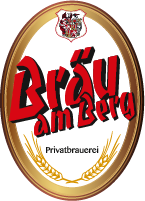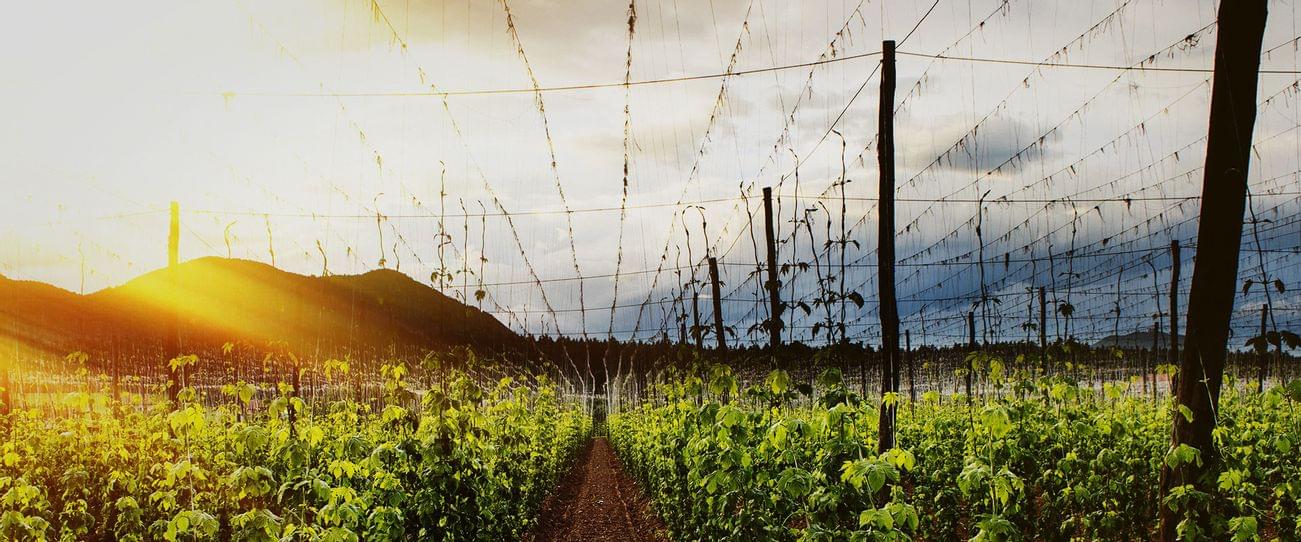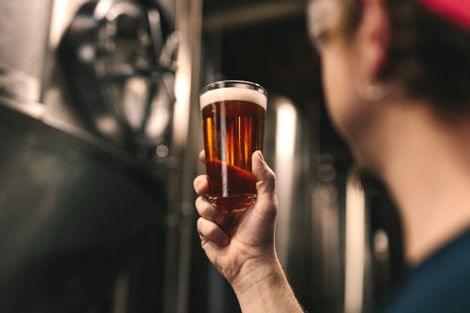Brewing beer: the brewing process
Beer is more than just water, hops, malt and yeast. In the beer making process various ingredients are mixed, processed and sometimes the structure of the raw materials is altered. The brewing process is made up of ten production steps from the fresh barley to the finished beer – we would like to present these steps in more detail.
QUALITÄT AUS ÖSTERREICH
The 10 steps of the brewing process
1. MALTING
The first step in the production of beer is malting. Firstly the fresh barley gets soaked in water and put in the so-called germinating boxes to germinate. In this phase the enzymes (amylase) are formed which are needed for the starch separation. The germinating process is then interrupted at the optimal stage by the drying (kilning). The green malt is dried carefully at 80° celsius and tastes slightly sweet when dried. The malt sugar later serves to feed the yeast cultures, which then form the alcohol.

2. MILLING
The second step in the brewing process is milling. The finished malt is milled, similar to the making of flour, so that it dissolves better in water. Malt mills produce various grades of crushed malt: husks, groats, meal, semolina and powder (from the coarsest to the finest).

3. MASHING
The third step in the brewing process is mashing. The milled malt is mixed with water in the mash tun – mashing-in. The starch in the grist dissolves and sugar, protein and tannin are released. The so-called malt extract is produced by this mashing process.

4. LAUTERING
The fourth step in the production of beer is lautering. The mash is filtered in the lauter tun as the husks sink and the wort is separated from the solid substances (spent grains). The wort is then further used in the brewing process, whereas the spent grains are generally used as cattle fodder.

5. WORT BOILING
The fifth step in the brewing process is wort boiling. In the brewing pan or wort kettle the wort is boiled and the hops are added. The taste of the beer depends on the type and amount of hops used: the more hops the bitterer the beer. As the water evaporates the wort is concentrated to the original wort, the malt enzymes are deactivated and tannin and protein elements are separated out to form the so-called trub.

6. WORT CLARIFICATION
The sixth step in the brewing process is wort clarification or drawing off. Here the wort is fed into the whirlpool and starts to rotate. Hop particles that have not dissolved and protein – the so-called trub – form a cone in the middle of the container, and the clear wort can be tapped off at the side. Then the clear wort is cooled to a temperature of between 10 and 20° Celsius in the wort cooler.

7. FERMENTATION
The seventh step in the beer making process is the alcoholic fermentation. This takes place in a fermentation tank where special brewing yeast is added. The yeast turns the malt sugar into alcohol and carbon dioxide. As soon as the malt sugar has fermented the yeast sinks and is collected. Depending on the type of yeast and the wort preparation used a top- or bottom-fermented beer is produced.

8. STORAGE
The eighth step in beer production is the storage. Young beer is stored anything from three weeks to three months in a storage tank at between 1 and 2° celsius. A secondary fermentation takes place; remaining yeast particles and protein-tannin sink to the bottom. The beer becomes clear and acquires its characteristic colour.

9. FILTRATION
The ninth step in the brewing process is the filtration. At this last stage any substances still remaining after fermentation and secondary fermentation, such as yeast particles, hop resin and protein are extracted and the beer gets its final clear colour.

10. FILLING
The tenth and final stage in the brewing process is the filling. Bottled beer and cans from Braeu am Berg are filled in the filling station Starzinger. The beer is filled using counter pressure to prevent any carbon dioxide from escaping. Barrels are filled directly in our brewery.








